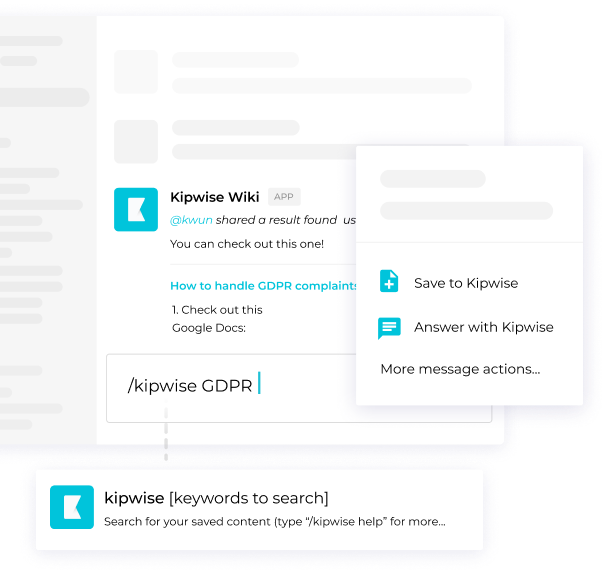In a world where remote work is becoming increasingly common, it's more important than ever to make sure that employees feel connected and able to share knowledge easily.
Even if your team is dispersed across different time zones, there are ways to make sure that the flow of knowledge stays strong. In this blog post, we'll discuss some tips for facilitating knowledge sharing in remote work environments.
Why knowledge sharing has become both critical and more challenging
In the post-pandemic working paradigm, many organizations have found that they need to pivot to a more remote-centric model.
This has led to an increase in the importance of knowledge sharing, as it's now more difficult for employees to simply walk over to a colleague's desk and ask a quick question.
This shift to remote work has made knowledge sharing more challenging, as workers are now dispersed and may not have the same opportunities for informal learning.
Security concerns have also arisen, as sensitive company information is now more vulnerable to being leaked.
At the same time, knowledge management for remote teams has never been more critical for organizational success.
So how can organizations facilitate knowledge sharing in this new remote work landscape?
Make use of an enterprise social network (ESN)
An enterprise social network is a platform that allows employees to connect with each other, share information, and collaborate on projects.
ESNs can be used for both formal and informal learning opportunities and is a major facilitator of knowledge management for remote teams.
For example, workers can post questions on an ESN and receive answers from colleagues in real-time.
This type of knowledge sharing is especially beneficial for remote teams, as it gives employees the ability to connect with each other regardless of location.
In addition to scheduled events, organizations can use ESNs to encourage employee connection and knowledge sharing.
Creating a hashtag that employees can use to share articles, blog posts, or other resources is a great way to promote ongoing learning.
Organizations can also use ESNs to recognize employees who are active contributors to the organization’s knowledge base.
Some of the more commonly used ESNs are Yammer, Slack, and Microsoft Teams.
Implement a knowledge management system
Organizations should also consider using a knowledge management system (KMS), also known as an internal knowledge base.
A KMS is a platform that stores and organizes an organization’s knowledge so that it can be easily accessed and used by employees.
KMSs often include features such as searchable databases, discussion forums, and document libraries.
They are a valuable tool for remote teams because they provide a centralized location for knowledge sharing.
Some enterprise KMS solutions that you can consider include Confluence, Kipwise, Bloomfire.
When choosing a KMS, be sure to consider your organization’s specific needs and goals.
Allow for informal interactions
Another way to facilitate knowledge sharing among remote employees is to create opportunities for informal interaction.
This can be done in a number of ways, such as hosting virtual happy hours or coffee chats, starting an internal social media group, or using video conferencing software for team check-ins or other tools to create video clips for education purpose.
These types of activities promote connection and allow for more organic knowledge sharing to take place. They also help, to some extent, to replicate the water cooler conversations that often happen in traditional office settings.
Check out some fun team building activities ideas for remote teams.
Put a remote working policy in place
While having a solid remote working policy won't specifically help to share knowledge, it can form the foundation on which knowledge sharing can take place.
A remote working policy outlines expectations and sets boundaries for employees who are working remotely. It should address issues such as work hours, communication expectations, and vacation days.
By having a remote working policy in place, you can create a more cohesive team that is better equipped to share knowledge with one another.
It can also help with security issues, as remote working policies often address data security and the use of company devices.
Create a learning and knowledge focussed culture
When knowledge sharing is a priority, it becomes part of the culture.
Organizations should promote a learning and knowledge-focused culture in order to encourage employees to share what they know.
This can be done by providing opportunities for employees to learn from each other, such as through mentorship programs, lunch and learns, or online courses.
It’s also important to recognize and reward employees who are active contributors to the organization’s knowledge base.
By making knowledge sharing a priority, organizations can ensure that their employees have the information they need to do their jobs well - even when they’re working remotely.
Make space for knowledge sharing in the weekly schedule
Keeping a few time slots open in the company’s shared calendar can create opportunities for employees to spontaneously share what they know with each other.
These knowledge-sharing sessions can take the form of brown bag lunches, quick presentations, or even impromptu conversations.
Having official time slots set aside for knowledge sharing can also help to normalize the practice and make it more acceptable for employees to take the time to share what they know.
Encourage questions
Finally, one of the best ways to promote knowledge sharing among remote employees is simply to encourage questions.
This might mean setting aside time during team meetings for a Q&A session or creating a specific channel on Slack for questions. To lower the burden of the knowledge experts in your team, you can consider adding our Kipwise Slack auto-answering bot to this specific Slack channel to provide answers to repeated questions automatically.
Encourage and empower knowledge sharing in your organization
By making knowledge sharing a priority, organizations can ensure that their employees have the information they need to do their jobs well - even when they’re working remotely.
Make space for knowledge sharing in the weekly schedule, create opportunities for employees to share their expertise, and encourage a culture of learning within the organization. Doing so will help to ensure that your remote team has the knowledge they need to be successful.




